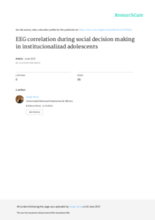Displaying 271 - 280 of 496
This chapter of Child Maltreatment in Residential Care describes Interaction Competencies with Children – for Caregivers (ICC-C), a preventative intervention approach to improve the quality of care and reduce the incidence of maltreatment within institutional care settings in Sub-Saharan Africa.
This chapter from Child Maltreatment in Residential Care presents the key findings from the Bucharest Early Intervention Project (2003), a longitudinal randomized control study which revealed the immense developmental impact of the severe deprivation experienced by children placed in institutional care shortly after birth.
This qualitative study explored the emotional experiences of 15 adolescents placed in foster care in South Africa.
Child Trends reviewed the literature on parenting knowledge among first-time parents with young children (2 years and younger). Specifically, they examined research on what parents know and want to know about parenting and child development, where they get their information, and what sources of information they trust.
This study investigated and compared electroencephalogram (EEG) functioning between a group of institutionalized adolescents and a never institutionalized group of adolescents during a social decision making task.
This paper offers recommendations for child welfare professionals, caregivers and systems to use the research on adolescent brain development to work effectively with youth in or emerging from foster care.
This study explores whether child and family-related factors are associated with later psychological problems in international adoptees in Finland. Researchers then investigated whether the length of time a child spends at home after adoption and before daycare moderates the aforementioned associations.
This study examined language and psychosocial skills of Greek institutionalized children in comparison to children of the same age brought up in family-based care.
language and psychosocial skills of Greek institutionalized children in comparis
This article offers a framework for determining the best interests of the child in decision-making processes concerning children in migration procedures.
The purpose of this study is to explore differences in family relationships, family subjective well-being (SWB) and overall SWB between children living in three different living arrangements – a two-parent family, a single-parent family and a separated family.



